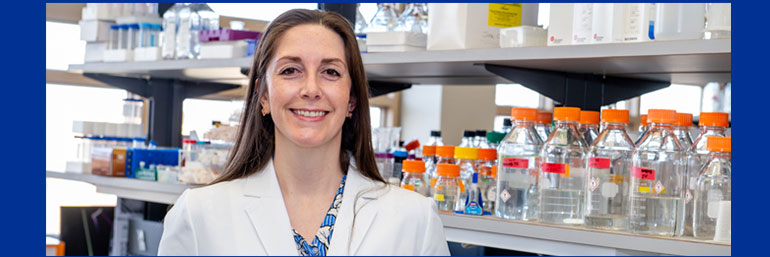Feb 5

Spotlight on NEOMED’s Research Focus Area: Diabetes, Obesity, and Metabolism
Jessica Ferrell, Ph.D., is part of NEOMED’s most recently formed Research Focus Area, which studies diabetes, obesity and metabolism – and how these conditions impact our health.
Diabetes, obesity, fatty liver disease, and atherosclerosis (the thickening or hardening of arteries caused by a buildup of plaque in the inner lining of an artery) are among the most common and preventable of all health problems. Researchers from this focus area are helping to form preventative measures that will lead to a much better quality of life while reducing a massive strain on the health care system with early detection. The researchers also aim to build collaborative internationally-recognized Center of Excellence for fundamental and translational research in diabetes, obesity and metabolism.
Dr. Ferrell, an assistant professor of integrative medical sciences, has been exploring non-alcoholic and alcoholic fatty liver disease since arriving at NEOMED in 2011 as a postdoc, before becoming a research assistant professor in 2015 and recently became an assistant professor at the start of 2022. About 40% of the U.S. population has fatty non-alcoholic liver disease, which can be benign but also cause diabetes and other diseases.
She is especially interested in how circadian rhythm disruption is associated with negative health outcomes in the liver and gut. This is especially true of individuals who experience these disruptions, such as shift work, sleep deprivation and chronic jet lag. The primary goals of Dr. Ferrell’s lab are to examine the regulation of metabolic circadian rhythms in the liver with respect to bile and homeostasis and to study the contribution of rhythm disruption to the development of symptoms of metabolic syndrome, including obesity, diabetes and non-alcoholic fatty liver disease.
Dr. Ferrell also makes it clear that life as a researcher is rife with failure – roughly 75% of experiments have negative results. This is a “good failure” however, as it rules out a hypothesis that will no longer need to be studied – basically allowing researchers to focus on other possible outcomes.
Related


